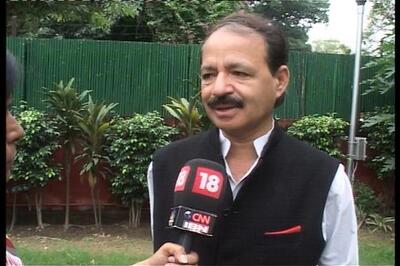
views
For Bail Bharath, life had never been better. At 47, he ran his own environmental engineering company and drove a Hyundai Elantra. But his perfect world came crashing down one Monday morning when his back began to hurt. At the hospital, the doctors recommended surgery and physiotherapy. But there was no guarantee that his back would heal completely even after the surgery. A disheartened Bharath even traded his favourite sedan for a Toyota Innova as it was less painful to get in and out of a bigger car.
Then, a friend's brother recommended ayurveda. Though sceptical, Bharath decided to give it a try. He went to an ayurvedic hospital called AyurVaid at Domlur in Bangalore. Bharath was pleasantly surprised. AyurVaid resembled a modern private hospital. He was shown some case studies where AyurVaid's treatment had cured patients with similar problems.
Today, Bharath is a happier man. He is optimistic that one day he will be completely free of the pain that almost derailed his perfect life.
For the doctors at AyurVaid, Bharath is another case study. Sometimes AyurVaid uses a combination of ayurveda and allopathy to treat patients. This is one of the few things that sets AyurVaid apart from the 2,400-odd ayurveda hospitals in the country.
"We bring out the best in both (allopathy and ayurveda)," says Rajiv Vasudevan, founder of AyurVaid. To change people's perception of ayurveda, he has used a business model that is similar to some allopathy hospitals.
AyurVaid documents every treatment administered in its network of six hospitals across four states. This detailed documentation and process-driven style of practice has also helped AyurVaid get the first NABH (National Accreditation Board for Hospitals and Healthcare Providers) certification for an ayurveda hospital.
The Origin
This evidence-based approach is also what makes Vasudevan sound like an ayurvedic physician. Though not formally trained, he can identify and rattle off cures for various diseases. He says, "The personality driven thing (practice) is the bane of a system like this. They say it is divine capability as opposed to science, which everybody can learn."
But not long ago, Vasudevan himself was a non-believer. A mechanical engineer from NIT, Calicut, and an MBA from IIM, Calcutta, his foray into ayurveda was accidental. In 2003, Vasudevan was working as a special officer for biotech with the Government of Kerala. The government had asked him to create a road map for the development of biotechnology in the state. While researching the field, he saw the connection between biotechnology and ayurveda. His began to delve more into ayurveda and saw a process hidden behind years of tradition. He decided to turn that process into a business model when he started AyurVaid.
Vasudevan opened his first two hospitals with funds, to the tune of Rs 50 lakh, borrowed from family and friends. The first hospital was set up at Ernakulam in 2005. The hospital, which has now shifted to Kochi, had 15 beds. Today, AyurVaid has five more hospitals, two in Bangalore and one each in Chennai, Hubli and Mumbai — and a customer base of 20,000 patients. From the beginning, Vasudevan ensured that systems such as the customer relationship management (CRM) were in place. After he formulated the other standards for treatment, in 2008, he went in for an initial round of funding and received Rs 4.5 crore from Acumen Fund, a non-profit global venture fund.
"AyurVaid presents an innovative business model to leverage traditional medicine in a way that can provide high quality care for growing chronic diseases, says Meghna Rao, country head, India, Acumen Fund. The year he received funds from Acumen, Vasudevan started the Domlur hospital with 30 beds.
Not Just Grandma's Remedy
"Ayurveda is a systems approach to health," says Vasudevan, "and a systems approach looks at multiple systems and their approach to each other. It's got a language. It's got physiology, anatomy, pharmacology. It's got a conceptual framework, where you say this is the thing I see in the system; so if this is happening in this system, the root cause for that is something happening in another system." Put simply, ayurvedic science believes in going to the root cause of a problem before recommending treatment.
Although this conceptual framework is taught in ayurvedic colleges, it is not practiced systematically in ayurvedic hospitals. Vasudevan and his team of doctors formulated a patient chart that goes deep into a patient's history like previous treatments, allergies, reports, etc. They make a conscious decision to refer a patient to an allopathic hospital should they feel the condition is not manageable. Consequently, they also get referred to by allopathic doctors when patients cannot find treatment in allopathy.



















Comments
0 comment